The time seems right…
Heat pumps tempt us with a very tantalising offer – lower cost, lower carbon heating and hot water that doesn’t involve burning gas.
They even woo us with the exciting possibility of energy independence for homes with enough solar panels, or other self-generation technology.
Heat pumps don’t directly burn fossil fuels to heat a home and can be run on renewable energies – whether you buy your electricity from a renewables provider or choose to make your own.
Within the coming decade (assuming the current commitments are kept), it won’t be possible to install a gas boiler in a new home. And not long after that, existing homes won’t be able to replace their current gas boilers.
The legislative changes will, presumably, drive take-up, but adoption has been slow out of the gate to adapt to the upcoming legal obligations. Many homes are still being built with gas boilers.
…but we’re lagging behind our neighbours
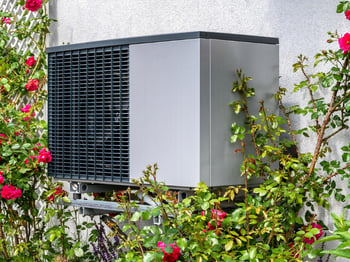
Our colleagues on the continent are racing ahead on the installation of heat pumps. The UK has some of the lowest heat pump sales of any country, according to data from 2021.
Countries with smaller populations, like Latvia, Norway, Poland, and Estonia are outpacing us, installing heat pumps up to thirty-two times more often than the UK.
At face value, heat pumps would seem like a natural fit for the UK’s largely temperate climate, so why haven’t they taken off yet?
In this article we explore why we’re still so hot on gas when heat pumps have been around so long.
Skip to a section
Heat pumps at a glance
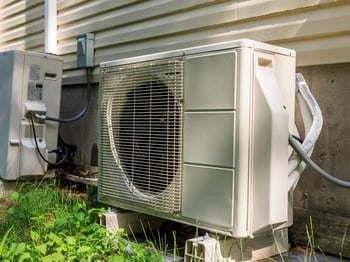
Fundamentally, heat pumps take an aerosolised refrigerant that’s allowed to become the same temperature as its surroundings, then compress it.
That refrigerant becomes hotter when compressed, and the hot compressed liquid is carried into the home and used for heating and hot water.
Refrigerators use the same technology to cool the inside of the fridge with aerosolised gas, absorb heat from the fridge, and then carry the hot, compressed refrigerant away to dissipate into the air.
While the outside might not always feel particularly warm, there’s no shortage of energy in it for the pump to absorb, compress, and feed back into the house.
There’s a few varieties of pumps out there, some using energy in the air, in the ground, or in water, but we’re focused mainly on one question - if they’re so good, why are we still burning gas?
We assembled a few of the biggest reason in this blog.
Up-front costs
Heat pumps are generally more expensive to install than gas boilers. There’s many reasons for this, and over time the prices should drop, but installations of heat pumps can cost upwards of £11,000, depending on the project.
Those with the means to self-build are more likely to choose a heat pump, as recent data has shown, but with self-build we’re more often talking about higher-income people building higher-priced homes. Cost up-front will still be a concern for developers building middle-priced housing for the public to buy.
Right now, a simultaneous pressing issue is that using electricity to generate heat doesn’t insulate us completely from volatile gas prices.
The UK’s energy mix is not renewable yet

Heat pumps can only completely insulate you from a volatile price of gas if the electricity to run them is generated without fossil fuels – gas in particular.
Your own at-home solar generation might do that, and buying from a renewables-only provider can help, but the current renewable supply couldn’t meet that demand unless the UK expanded its use of renewable energy sources.
While the UK uses very little coal and oil to meet the demand placed on the grid, roughly 40% of the UK’s energy needs are met with gas. The UK relies on international imports to meet that demand, with more than half of that gas being bought from abroad.
Switching your heating and hot water to an electricity-only model doesn’t insulate home owners from a volatile cost of gas, because they’ll very likely still be paying for gas in their electric energy mix.
Renewables currently account for around a quarter of the UK’s energy production. In the future, the renewables mix should increase as gas is excised and replaced with other energy sources that disconnect from changeable international markets. But that commitment will take decades to come into effect.
Making any heating, whether it’s from a gas boiler or a heat pump, more efficient would have a significant impact on bills. One way to achieve that efficiency is through insulation.
Insulation of UK homes
Heat pumps need to be combined with robust insulation to get the full benefit of their advantages. Which is bad news for the UK’s older, inefficient housing stock.
In fact, the UK’s housing stock is some of the worst-insulated of our neighbours, losing heat three times faster than other nations in Western Europe.
Heat pumps produce a more efficient ratio of electricity used to heat generated when they’re operating at temperatures lower than the usual operating temperature of a gas boiler.
That lower temperature of operation is at its best with an effectively insulated home. Proper insulation means a heat pump working at that lower temperature can be just as effective as a gas boiler.
In fact, a very well insulated home could mean that heating could be achieved with a smaller compressor, driving down the amount of energy needed to fuel the compressor in the first place.
In the long run, this could mean much lower prices to heat a home. But as we discussed above the energy mix in the UK still relies on imported fossil fuels, and it does take some time for the returns to reach a consumers’ pockets when you factor in the cost of a heat pump.
Insulation is not the end of the problems of the UK’s existing housing stock when it comes to introducing heat pumps.
Inertia
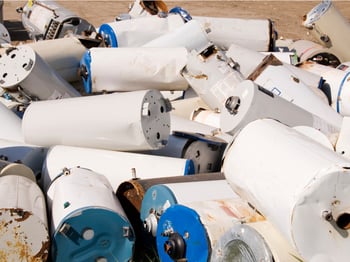
A boiler installed tends to remain installed, unless acted on by a sufficiently motivated homeowner.
Gas boilers are already there, they’re wide-spread, they’re familiar, and many consumers would prefer to find a way to simply pay less for gas than convert to technology they’re not familiar with.
Research produced for the UK government in 2020 showed that more than 60% of the public haven’t heard of a ground-source heat pump, and 75% haven’t heard of an air-source heat pump.
The burning of some kind of material to create heat is a simple, primal concept to understand. For as long as humans have desired heat, we’ve burned things to get it.
Heat pumps, while not a new concept or technology, just aren’t as familiar and time-tested in our homes as our usual gas boilers.
On top of that, according to Wired Magazine, a gas boiler technology is already installed in approximately 85% of UK homes.
That complicate matters more. We aren’t just asking people to adopt a new technology, but to remove the existing heating infrastructure in their home and install new equipment.
Not every home will enjoy a design that’s easily compatible, and some will have to make visible adjustments to their home. While we’re conditioned to be familiar with the presence of boilers and their various accessories, the new technology of heat pumps is not just visible, but novel.
Combined, this presents a physical and emotional barrier to incorporating the new technology. This brings us nicely to the next point – the change to the home that a pump requires.
Disruptions to property
As we mentioned earlier, new technology will bring different inconveniences that will stand in the way of eager adoption of the heat pump.
Some people don’t like the appearance of air-to-air units installed on the outside of their house, and others might object to digging their garden up for a ground source, or having the pump connect to their pond.
Other residents find them noisy, as the sound is comparable to that of an air conditioning unit. Using heat pumps to generate water also means the introduction (or reintroduction) of a hot water tank in the property.
While we’re used to the inconveniences that come from our gas boilers, the inconveniences of a heart pump are novel, which could easily dispirit a prospective buyer.
Speaking of running – some consumers aren’t confident enough in the performance of heat pumps in changeable weather conditions to feel good about a switch.
Performance is weather-affected
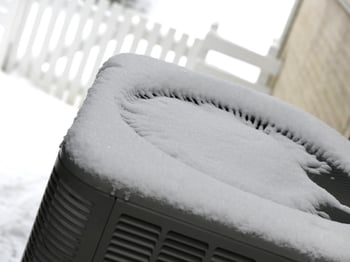
The less heat there is in the air, ground, or water, the more work a heat pump compressor has to do. The UK being a generally temperate country (if not quite a warm one at time of writing!) means relatively even performance of a heat pump throughout the year.
The UK does, however, still experiences cold snaps that pushes temperature down into negative Celsius.
When it’s much colder, there’s a lot less energy to draw out of the air, meaning the pump has to use more electricity to reach an ideal heat. The colder it gets, the more inefficient the pump is. This is where the insulation situation is once again crucial for the solid operation of heat pumps.
Assuming you’re confident with everything so far, there’s one crucial obstacle that stands in the way of many environmentally-friendly schemes – the availability of specialists to install them.
Specialist installation
There’s a large imbalance between the availability of trained gas boiler installers and trained heat pump installers – according to one source, there’s as many as 97,000 more gas installers than heat pump installers.
Some of that is, no doubt, chicken and egg. The UK public hasn’t raced to install heat pumps in their homes, so the public also hasn’t raced to qualify themselves to install them. After all, why would you?
If there’s a sudden surge in demand, however, thousands of people would need to be trained into specialist installers, and not just for heat pumps.
Many of the emerging technologies that will make up net-zero homes of the future will require specialist installation, and with fewer young people to fill the gap (and a general labour shortage in the UK construction sector worsening), more people will need to be retrained.
We’ll admit, we’ve painted a pretty gloomy picture of the humble heat pump so far. But it’s not over, and the situation could change very quickly to make heat pumps more of a staple in UK homes.
How could we warm up to heat pumps?
As ever, it’s little good to endlessly list the problems of heat pumps without acknowledging that some of the issues are a blend of problems that come from beyond the technology itself.
There are a number of political, social, economic, and personal changes that could come together and improve the market for heat pumps in the UK.
Some of those changes could include:
Shifts in consumer behaviour and demand
.jpg?width=350&name=heat-pump-installation-project-picture-id1094148290%20(1).jpg)
As discussed on the LABC Warranty blog elsewhere, self-builders are more frequently opting for newer technology like heat pumps.
More homes are also choosing to buy green tariffs, with the majority of consumers, when polled, saying that they consider the environmental aspect of their energy purchases (even if those green tariffs have raised the possibility of greenwashing by providers, but that’s another topic entirely).
If this demand starts to trickle into what more middle-income home buyers expect to see in their properties, private developers may choose to include heat pumps more often in the homes they build.
In addition to that, as we saw in the government data earlier, willingness to change is high but awareness is low – greater awareness of the technology as it proliferates more homes across the self-build and social housing markets could drive a shift in demand from the public.
Continued favour from government
Until recently, heat pumps already enjoyed a favourable tax position of 5% instead of 20% compared to gas boilers, and have been earmarked as the primary heating tech for the future by national government and many local authorities in urban areas.
In the 2022 spring statement, that 5% was driven down to 0%, to much approval from the heat pump industry and associated businesses.
Maintaining that legislative favour, and offering greater incentives for existing boiler owners to retrofit, could change the scene considerably in the coming years, in no small part driven by our net-zero obligations.
As we know, the commitment to move away from gas is, through our net-zero commitments, essentially enshrined in UK law. The UK’s net-zero target date is 2050, and the vast majority of the housing that will be available then has already been built – but with 85% of it using a gas boiler.
Achieving net zero by weening ourselves off gas will require a deep retrofit of the existing housing stock to incorporate alternative heating options, and heat pumps are likely to be at the forefront of that change when alternative combustion fuels like hydrogen appear unlikely to plug the gap.
Long-term gas price volatility
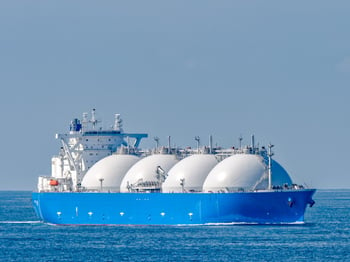
Committing to the installation of many more gas boilers in the future would assume that gas prices will remain at a level that consumers can afford. This would be a very tricky prediction, given the complicated nature of the global gas market, and the UK’s market-led approach to gas pricing.
Making any future prediction on free-market gas prices decades in the future would be a tricky task, but given diminishing supplies of accessible gas, and the current international situation for gas, it’s hard to see one where gas becomes more plentiful and cheaper for consumers.
These social, political, and economic factors, combined, paint a much happier picture for the future of the heat pump than the current situation in the UK. It will be interesting to see how all these factors play out in the coming decades, and the role that heat pumps play in the UK’s transition to a net-zero housing sector.
Questions for LABC Warranty?
If you have any questions or comments for the LABC Warranty team, you’re always welcome to contact us directly.
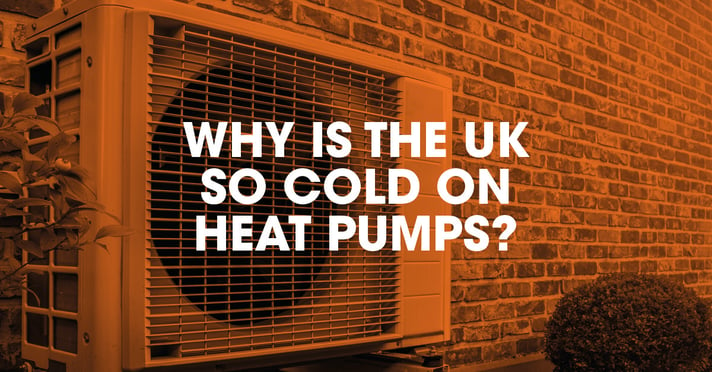
Have your say